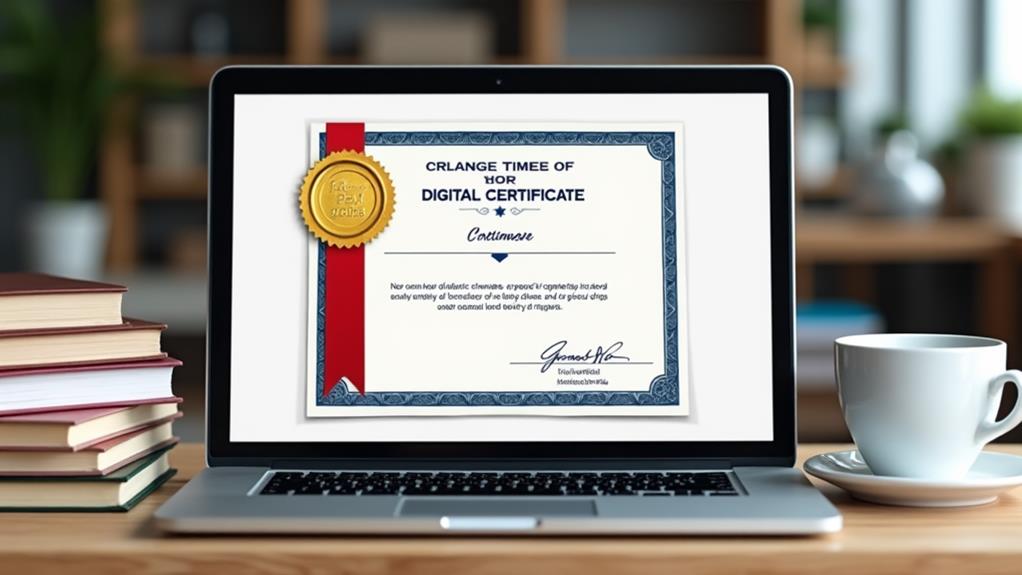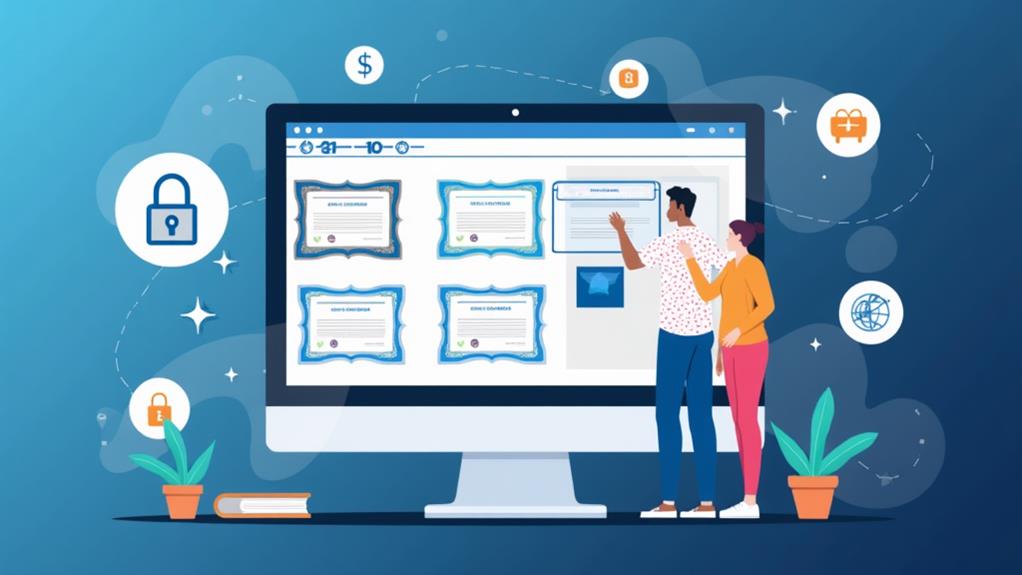
Providing certificates for your online course can vastly enhance student engagement, boost course credibility, and improve marketability. Digital certificates offer instant, cost-effective recognition which encourages course completion and allows easy social sharing. Accredited certificates, validated by third-party entities, are particularly valuable in competitive job markets. They demonstrate alignment with industry standards, thereby attracting more learners. Using platforms like Heights for designing and automating certificate issuance can streamline the process and maintain consistency. Collecting student feedback on certificates helps refine the course and its rewards. For more insights and strategies, continue exploring this topic further.
Key Takeaways
- Certificates boost student engagement and completion rates by providing tangible rewards for their efforts.
- Digital certificates are cost-effective, instantly issued, and easily shared online, enhancing accessibility.
- Accredited certificates enhance course credibility and recognition, beneficial for employability in competitive job markets.
- Customizable certificate templates align with branding, improving professionalism and course differentiation.
- Automating certificate issuance reduces administrative workload and ensures consistency across all certificates.
What Are Online Course Certificates?
Online course certificates serve as formal acknowledgments of students' commitment and successful completion of a course, offering tangible proof of their efforts and achievements.
These certificates, whether digital or physical, play an essential role in validating a learner's participation and dedication. Customizable through various tools, such as Canva or course hosting platforms like Heights Platform, certificate design becomes an integral part of the learning experience, enhancing both the aesthetic appeal and the professional value of the credential.
The design of these certificates can greatly impact student motivation. A well-crafted certificate not only serves as a reward but also as an incentive for learners to engage more deeply with the course content.
Elements such as branding, course information, and personalized details contribute to the certificate's credibility and attractiveness. Incorporating niche selection elements can also help align the certificate with market demands, further increasing its value.
Even though these certificates do not necessarily guarantee mastery of the skills acquired, they add a layer of validation that can be highly beneficial in competitive job markets. Employers often seek tangible proof of training, making these certificates valuable assets for students looking to advance their careers.
Therefore, thoughtful certificate design and issuance are essential for fostering a motivating and rewarding learning environment.
Types of Course Completion Certificates
When offering course completion certificates, it's essential to understand the distinctions between digital and physical certificates, as well as accredited and non-accredited options.
Digital certificates, typically in PDF format, provide immediate accessibility, whereas physical certificates can add tangible value, often preferred for professional display.
Customized certificates can greatly boost engagement and satisfaction among participants, similar to how personalized messaging enhances client relationships in email marketing.
Accredited certificates, validated by recognized third-party entities, enhance credibility and can be a requirement in certain industries, while non-accredited certificates are more suited for personal development and general knowledge courses.
Digital vs. Physical Certificates
Frequently, educators and course creators face the decision of whether to offer digital or physical certificates to their students. Understanding the nuances between these options can markedly impact learner satisfaction and course marketing.
Digital certification advantages are manifold. They are typically provided in downloadable formats like PDF, enabling easy sharing and storage. These certificates can be automatically issued through online platforms, streamlining the process for both educators and learners.
Additionally, digital certificates often include social sharing options, enhancing their versatility and facilitating online promotion. Their convenience and eco-friendliness also contribute to their rising popularity.
In contrast, physical certificates offer a tangible appeal that can enhance the perceived value of the achievement. Receiving a physical document, often printed and mailed, can provide a sense of accomplishment that digital formats may lack.
However, this method requires manual handling and shipping logistics, which can be costlier and more time-consuming.
Course creators should consider the following:
- Ease of distribution: Digital certificates can be issued instantly, while physical certificates require shipping.
- Cost-effectiveness: Digital formats are generally more economical.
- Learner preferences: Some students may value the tangible nature of physical certificates more highly.
Ultimately, the choice between digital and physical certificates should align with both educational goals and learner expectations.
Accredited vs. Non-Accredited
Having explored the distinction between digital and physical certificates, it is equally important to understand the differences between accredited and non-accredited course completion certificates. Accredited certificates are validated by third-party entities such as universities or professional associations, greatly enhancing the certificate value. These types of certificates can be essential for meeting industry requirements, as many job markets recognize and prefer accredited credentials.
The process for obtaining accreditation often involves forming partnerships with educational institutions or professional organizations, and while this can be complex and require financial investment, the payoff regarding credibility and perceived value is substantial.
Conversely, non-accredited certificates, though lacking formal recognition, still provide learners with proof of course completion and can be quite valuable for personal development and general knowledge acquisition. These certificates are more common on platforms like Udemy and Alison, which focus on making a wide range of learning opportunities accessible.
Non-accredited courses can still attract learners by offering engaging content and aesthetically pleasing completion certificates, thereby enhancing a learner's professional profile. Both types of certificates have their respective advantages and can be strategically leveraged to meet diverse learner needs and objectives.
Accredited vs. Non-Accredited Certificates
Accredited certificates, validated by reputable third-party entities like universities or professional associations, markedly enhance a course's credibility and recognition in specific job markets.
Leveraging influencer partnerships can greatly boost the visibility of these accredited courses, attracting a broader audience.
However, the accreditation process involves intricate partnerships and applications, which can be both time-consuming and costly.
In contrast, non-accredited certificates, while easier and quicker to implement, lack the formal recognition but still serve well for personal development and skill-building purposes.
Accreditation Process Insights
Maneuvering the accreditation process for online course certificates can be a vital decision in enhancing the course's credibility and value. Accreditation timelines can vary markedly depending on the chosen accreditation bodies, which often include universities or professional associations.
These entities require a formal application and a financial investment, and the process might involve several intricate steps, including establishing partnerships with educational institutions or meeting specific industry standards.
To provide a deeper understanding, consider the following points:
- Accreditation Timelines: The duration for obtaining accreditation can range from a few months to over a year, influenced by the thoroughness of the required evaluations and the responsiveness of the accreditation body.
- Accreditation Bodies: Choosing the appropriate accrediting institution is essential. Institutions like universities and professional associations have different criteria and reputations, affecting the perceived value of the certificate.
- Financial and Administrative Investment: The cost of accreditation can be substantial, encompassing application fees, compliance with standards, and ongoing maintenance.
Additionally, administrative efforts are necessary to guarantee continuous compliance and renewal.
Impact on Credibility
In the domain of online education, the distinction between accredited and non-accredited certificates can greatly influence a course's perceived credibility. Accredited certificates, validated by respected third-party entities like universities or professional associations, markedly enhance a course's credibility. This validation is often essential for specific job qualifications in competitive industries, thereby increasing learner motivation to enroll.
The intricate process of obtaining accreditation, while complex and costly, typically involves partnerships or applications with educational institutions or professional bodies. However, this investment can considerably boost a course's visibility and appeal.
Conversely, non-accredited certificates, although still valuable, may not carry the same weight in the eyes of employers. They are less effective for career advancement in fields that prioritize formal recognition, yet they serve as indicators of a learner's commitment to professional development. For many, these certificates offer considerable personal enrichment or skill enhancement.
The certificate design for both accredited and non-accredited programs should reflect their respective values, clearly communicating the course's quality and purpose.
Ultimately, offering accredited certificates can improve employability and credibility, attracting more participants seeking proof of quality and recognition for their professional development.
Why Accreditation Matters
Accreditation plays a vital role in boosting the credibility of online courses, making them appealing to a wider audience, including potential students and employers who prioritize recognized credentials.
The accreditation importance cannot be overstated as it guarantees that the course meets established industry standards, thereby assuring quality and relevance. For online courses aimed at specific job qualifications, accreditation is often essential for aligning with industry expectations and improving employability for graduates.
Additionally, certification enhances credibility in the freelance market, which is a valuable insight for course creators looking to attract professionals who seek to validate their skills. The process of obtaining accreditation usually involves collaboration with universities or professional associations, which can greatly raise the course's reputation in a competitive market.
Accredited certificates are particularly significant for professional development programs, even if they might not be essential for personal knowledge courses. This investment, although potentially costly and complex, offers long-term benefits by establishing trust and recognition within the industry.
- Industry Standards: Accreditation confirms that courses align with current industry standards, guaranteeing that learners acquire up-to-date and applicable knowledge.
- Enhanced Marketability: Accredited courses are more marketable, attracting a larger pool of students and employers looking for validated skills.
- Reputation Boost: Partnerships with reputable institutions for accreditation can enhance the course's credibility and standing in the educational marketplace.
Benefits of Offering Certificates

Offering certificates for your online course can greatly boost student engagement and completion rates, as learners are motivated to achieve a tangible reward for their efforts.
Additionally, certificates enhance the credibility of your course, making it more appealing to potential students who seek recognized validation of their skills.
Incorporating data-driven strategies into your course can further increase engagement and completion rates by up to 72%.
This not only increases course enrollment but also establishes a sense of accomplishment and confidence among learners.
Boosts Course Engagement
Many online educators have observed that the incorporation of completion certificates can greatly enhance course engagement, addressing the common challenge of low completion rates, which average only 13% for online programs.
By offering certificates, educators provide a tangible incentive that boosts course motivation and increases student satisfaction. This form of recognition not only instills a sense of accomplishment but also encourages learners to complete their programs, thereby improving overall engagement.
Certificates serve as a powerful motivator because they:
- Increase course motivation: The prospect of receiving a certificate upon completion can drive students to stay committed and engaged with the course material.
- Enhance student satisfaction: Earning a certificate validates a student's efforts, contributing to a feeling of achievement and fulfillment.
- Encourage social sharing: Students are inclined to share their certificates on social media platforms, which can organically expand the course's reach and attract new learners.
Furthermore, the presence of completion certificates can act as a catalyst for deeper engagement with the course content, as students are motivated by the milestone of earning a formal recognition of their hard work.
This, in turn, can lead to more positive reviews and increased word-of-mouth marketing, further amplifying the course's success.
Enhances Course Credibility
In the competitive landscape of online education, providing completion certificates greatly enhances course credibility. Certificates serve as recognized proof of completion, validating the learner's commitment and effort. This tangible acknowledgment can remarkably motivate learners, encouraging them to engage more deeply with the course material and complete their studies.
A well-thought-out certificate design not only adds aesthetic value but also conveys professionalism and legitimacy. This perceived legitimacy can attract more participants, boosting purchase conversion rates and making the course offerings more appealing to prospective students who seek credible and recognized credentials.
Moreover, the availability of completion certificates can differentiate your course from others lacking this feature, enhancing its visibility and marketability. Potential learners are more likely to trust and enroll in courses that offer certificates, knowing their efforts will be formally recognized.
Sharing these completion certificates on social media platforms amplifies this effect, creating organic reach and promoting word-of-mouth marketing. As learners proudly display their achievements, they inadvertently endorse the course, further establishing its credibility and attracting new enrollees in a competitive market.
Therefore, offering certificates is a strategic move that benefits both the course provider and the learner.
Boosting Student Engagement
To effectively boost student engagement in your online course, integrating completion certificates can be a game-changer. Certificates act as a powerful student motivation tool, encouraging learners to persist through the course material with the promise of a tangible reward upon completion.
Given that online courses typically suffer from low completion rates—averaging around 13%—offering certificates can greatly enhance engagement strategies, leading to higher completion rates. Certificates not only motivate students but also raise their satisfaction levels. When learners know that their efforts will be formally recognized, they are more likely to stay committed and provide positive reviews, which further enhances the course's reputation.
This increased engagement also fosters a sense of community as students often share their achievements on social media, thereby promoting the course organically. Additionally, just as remote bookkeeping yields high earnings through specialized tasks, offering certificates can add substantial value to your educational offerings.
Moreover, engaged students who earn completion certificates are more inclined to become repeat customers, driven by the recognition and validation they receive.
- Boosted Completion Rates: Tangible incentives like certificates can greatly increase course completion rates.
- Enhanced Community Feel: Sharing achievements fosters a sense of community and increases the course's organic reach.
- Long-term Engagement: Recognized efforts can lead to brand loyalty, encouraging continuous learning and repeat enrollments.
Incorporating completion certificates is a strategic move to raise student engagement and course success.
Enhancing Course Credibility

Enhancing your course's credibility through offering certificates can greatly bolster its perceived value and appeal. Accredited certificates not only validate the rigor and quality of your content but also align with the 80% of employers who recognize such credentials as proof of acquired skills and knowledge.
Additionally, just like expense tracking apps provide clarity for financial management, certificates offer clarity and validation for educational achievements.
In addition, the ability for students to share these certificates on professional platforms like LinkedIn amplifies their employability and showcases your course's impact in a competitive job market.
Accredited Certificate Benefits
Accredited certificates play a pivotal role in boosting the credibility of online courses. The value of a certificate is substantially enhanced when validated by recognized third-party entities, such as universities or professional associations.
This accreditation process not only reassures students about the quality of the course but also distinguishes the offering in a crowded market. When courses undergo accreditation, they often form partnerships with educational institutions, which can raise the course quality and guarantee alignment with industry standards.
The benefits of offering accredited certificates extend beyond just course quality. Accredited certificates provide tangible proof of competence, which is highly sought after by employers. This, in turn, can lead to increased student enrollment, as learners gravitate towards courses that offer recognized credentials.
Key benefits of accredited certificates include:
- Enhanced Employability: Accredited certificates can greatly increase a student's employability in competitive job markets.
- Course Differentiation: Accreditation helps distinguish a course from competitors, making it more appealing to potential learners.
- Industry Relevance: Accredited courses often involve partnerships with educational institutions, ensuring that the curriculum meets industry standards.
Employer Recognition Value
When considering the credibility of an online course, the value of employer recognition cannot be overstated. Offering certificates enhances course credibility, as employers often seek proof of completed courses when evaluating candidates for job qualifications. Research indicates that 70% of employers consider certifications as a crucial factor during hiring. This underscores the importance of aligning your course offerings with current certification trends to meet market demands effectively.
Accredited certificates, validated by third-party entities, add another layer of credibility, particularly important in competitive job markets where specialized qualifications are required. Such accreditation guarantees that the certificate is not only a confirmation of skill acquisition but also a considerable marker of commitment to professional development. This tangible evidence makes course graduates more attractive to potential employers, often tipping the scales in their favor during recruitment.
Furthermore, actively seeking employer feedback can help you refine your course content to better meet industry standards and expectations.
Promoting the availability of recognized certificates in your marketing materials not only communicates the value of your program to students but also enhances its visibility to hiring managers. By doing so, you can greatly boost the employability of your course graduates.
Marketing Your Course With Certificates
Offering certificates for your online course can serve as a strategic marketing tool that enhances both the visibility and perceived value of your educational offerings.
Integrating certificates into your marketing strategies can greatly boost course visibility and attract more participants. Courses that offer certificates often see higher purchase conversion rates as learners are drawn to the tangible recognition of their achievements.
Promoting certificates as part of your course can also facilitate organic reach through social media. When participants share their certificates online, it acts as a powerful form of word-of-mouth marketing.
Additionally, consider engaging potential students through demo classes to showcase the value of your course and the certificate they will earn.
- Increased Course Visibility: Courses with certificates are more likely to attract learners because they offer a tangible reward for completion.
- Enhanced Social Proof: Graduates sharing their achievements provide endorsements and testimonials, which can attract new students.
- Competitive Edge: Offering certificates validates the skills and knowledge acquired, making your course more appealing to those seeking credible credentials.
Choosing a Certificate Platform

Selecting the right certificate platform is a pivotal decision that can greatly impact the efficiency and appeal of your online course. A user-friendly interface is essential, enabling easy customization of certificate designs to guarantee they align with your branding. This customization capability not only enriches the learner's experience but also strengthens your brand identity.
For example, platforms like Skillshare Learning and Growth encourage networking and community engagement, which can be an added benefit for your learners.
When conducting platform comparison, prioritize those that offer integrated certificate generation upon course completion. This feature streamlines the issuance process, saving valuable time and minimizing administrative workload.
Automation features are equally important; they enable efficient management of student completions without manual intervention, guaranteeing a seamless and consistent experience for all learners.
Cost-effectiveness is another critical factor. Aim for platforms with pricing models under $100 per month to maintain financial sustainability for your online course business. Affordable platforms often provide a robust set of features without compromising quality.
Additionally, consider platforms that offer social media sharing options. This functionality allows students to easily showcase their achievements, thereby promoting your courses to a broader audience.
Customizing Certificate Templates
In enhancing the value and appeal of your online course, customizing certificate templates is fundamental to aligning the visual elements with your branding. By tailoring certificate designs, course creators can guarantee that colors, fonts, and logos reflect their unique identity, which improves consistency and professionalism.
This approach is similar to subject line optimization, where clear and enticing subject lines are vital for improving open rates.
Many platforms, such as Heights Platform, provide ready-made templates that are easily modifiable to include essential details like course information, student names, and completion dates. This flexibility not only saves time but also raises the overall learning experience.
The ability to preview certificate designs before finalizing them guarantees that course creators can make necessary adjustments to meet their quality standards. This step is vital for maintaining a high level of professionalism and guaranteeing that the final product aligns perfectly with your branding.
- Visual Consistency: Customizing certificates to match your brand's colors and fonts promotes a cohesive visual identity across all course materials.
- Perceived Value: Personalized certificates enhance the perceived value of the course, motivating students to complete it for tangible recognition.
- User-Friendly Tools: Free online design tools like Canva offer easy-to-use options for creating personalized certificate templates without needing extensive graphic design skills.
This attention to detail in certificate design and branding integration considerably contributes to a rewarding learning experience.
Automating Certificate Issuance

Why invest time in manual certificate management when automation can streamline the entire process? Automating certificate issuance considerably reduces administrative workload by enabling instant distribution upon course completion. This not only enhances the efficiency of your operations but also boosts the student learning experience by providing immediate recognition of their achievements.
Platforms offering integrated features for automatic certificate generation guarantee that each certificate adheres to a consistent certificate design, reinforcing your brand's professionalism. Customizable templates can be reused effectively, maintaining uniformity across all certificates issued. By setting specific criteria for certificate eligibility, course creators can guarantee that only students who meet the required standards receive these accolades, thereby preserving the integrity of the recognition process.
Moreover, the automation of certificate issuance plays an essential role in boosting student motivation. The immediate receipt of a certificate upon course completion serves as a tangible reward, encouraging learners to stay engaged and complete their courses.
Additionally, tracking issuance statistics through automated systems allows educators to monitor engagement and completion rates, providing valuable insights for data-driven course improvements. By embracing automation, educators can focus more on enhancing content and less on administrative tasks, ultimately benefiting both course creators and learners.
Using Heights Platform for Certificates
Heights Platform provides a robust solution for course creators looking to enhance their certification process. With its ready-made certificate templates, customization options, and automated features, Heights Platform simplifies the creation and distribution of course completion certificates. This can greatly boost student motivation by providing tangible recognition of their achievements.
Key benefits include:
- Customizable Certificate Design: Heights Platform allows you to easily modify templates with your branding elements, such as colors and fonts, ensuring consistency with your course identity.
- Automated Issuance: The platform supports automatic certificate generation upon course completion, streamlining the process and minimizing administrative tasks. This efficiency enables you to focus more on delivering quality content.
- Unlimited Certificates: Heights Platform offers unlimited certificate generation without incurring additional fees, making it a cost-effective option for scaling your online courses.
Moreover, the platform enables manual review of certificates before issuance, ensuring that each certificate meets your standards and accurately reflects student accomplishments.
Automated notifications keep students informed about their progress and certificate availability, enhancing their learning experience and maintaining their motivation.
Strategies for Certificate Distribution

Effective certificate distribution strategies are vital for recognizing student achievements and maintaining high levels of engagement in your online course. To streamline this process, automating the issuance of certificates through your course platform, such as Heights Platform, can greatly reduce administrative workload.
Clearly defining the criteria for certificate eligibility is essential; link certificates to completed assignments or quizzes to guarantee students meet specific learning outcomes before receiving their certificates.
Utilize visually appealing and customizable certificate design templates to enhance the perceived value of the certificates and effectively reflect your branding. This not only makes the certificates more attractive but also aligns them with your course's professional image.
Setting up automated notifications to inform students when they have successfully completed a course and their certificate is ready for download can further improve their overall experience, assuring timely recognition of their achievements.
Additionally, regularly monitoring and analyzing certificate issuance statistics can provide valuable insights into student engagement and completion rates. This data allows for data-driven adjustments to your course offerings, making sure they remain effective and engaging.
Collecting Student Feedback
Collecting student feedback is a pivotal component of refining your online course's certificate offerings. Implementing effective feedback mechanisms guarantees that the certificates provided meet student expectations and enhance the course's overall value. Regular surveys or feedback forms conducted post-course completion can offer insights into student satisfaction regarding certificate design, issuance processes, and the perceived impact on their learning experience.
Engaging with students through these feedback channels not only fosters a sense of community but also raises student engagement. By analyzing feedback, educators can identify trends and preferences, such as the choice between digital and physical certificates, which can inform future strategies.
Utilizing this valuable input can lead to meaningful improvements:
- Enhanced Certificate Design: Tailor certificate aesthetics and content based on student preferences, increasing their perceived value.
- Streamlined Issuance Process: Address any bottlenecks in the certificate distribution process, guaranteeing a seamless experience.
- Motivation and Completion Rates: Refine criteria and processes based on feedback, motivating students through recognition and potentially boosting course completion rates.
Incorporating student feedback is therefore essential for maintaining and improving the quality of certificate offerings, ultimately contributing to a more satisfying and engaging learning journey.
Common Challenges and Solutions

While student feedback is instrumental in refining the certificate offerings, it is equally important to acknowledge and navigate the common challenges associated with providing certificates for online courses.
One frequent issue is the perception that certificates may diminish the value of learning. Address this by emphasizing that certificates acknowledge effort and participation without equating to mastery of skills. Thoughtful certificate design can further reinforce this distinction.
Inconsistent pacing among students can complicate completion tracking. To manage this, implement clear completion criteria and personalized learning pathways. This approach guarantees that each learner progresses according to their own pace, while still meeting established milestones.
Another challenge is the potential for over-issuance of certificates, which can dilute their value. Set rigorous standards for issuance and conduct manual reviews to guarantee quality control, thereby maintaining the integrity of the certification process.
Students might also have inflated expectations regarding the knowledge acquired. Mitigate this by providing clear, detailed descriptions of what the certificate represents regarding skills and knowledge.
Effective management of certificate distribution is essential. Utilize automated notifications and monitor issuance statistics to streamline processes and enhance the overall learning experience.
These issuance strategies will guarantee smooth and efficient certification for all participants.
Frequently Asked Questions
How to Generate a Certificate for a Course?
To generate a certificate for a course, employ automation tools for seamless issuance. Focus on certificate design by utilizing customizable templates that reflect your branding, ensuring a professional and structured process tailored to enhance the learner's experience.
What Are the Benefits of an Online Certificate?
The benefits of an online certificate include enhanced certificate credibility, which validates the learner's skills, and promotes professional advancement by improving employability. Additionally, it motivates course completion, fosters a sense of accomplishment, and supports social sharing for increased visibility.
Do Certificates From Online Courses Have Any Value?
Certificates from online courses hold substantial value, as certificate credibility and industry recognition enhance employability. They validate acquired skills, motivate learners, and strengthen professional profiles, particularly in competitive job markets seeking continuous learning and specific industry expertise.
How Do I Convince for an Online Course?
To effectively market and promote your online course, highlight the tangible benefits such as career advancement and recognized competence. Utilize strategic marketing strategies, including social media sharing and testimonials, to create a compelling narrative that resonates with potential learners.
Conclusion
In conclusion, offering certificates for online courses enhances learner motivation, validates acquired skills, and can improve course completion rates. Differentiating between accredited and non-accredited certificates, coupled with strategic distribution and feedback collection, guarantees the effectiveness of certification programs. Platforms like Heights offer streamlined solutions for managing certificates. Addressing common challenges through thoughtful planning further solidifies the credibility and value of the certificates, ultimately contributing to a more enriching online learning experience.
Leave a Reply